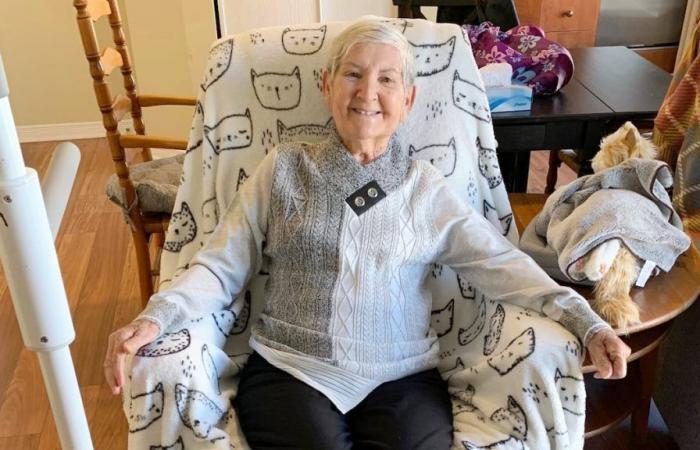
Care that takes too long, patients ignored or even a lack of knowledge: at least six coroner’s reports over the past five years call for better supervision of beneficiary attendants and the care they provide to vulnerable patients.
In pain for four days
An 88-year-old woman who broke her hip in a fall in a Gatineau seniors’ residence was only sent to hospital four days later, even though she was screaming in pain.
• Also read: “This profession must be supervised”: coroners urge Quebec to better monitor beneficiary attendants
Dolorès Kearney was crying a lot and screaming “help, mom” since July 23, 2023, which is unusual for the eldest suffering from Alzheimer’s, notes coroner Francine Danais in her report.
But it is impossible to really know what happened. “None [note] PABs which were provided to me despite my request. […] I come up against the lack of relevant and reliable information coming from the staff providing care in an RPA,” she writes, about the La Gappe residence.
Relatives of Mme Kearney had advised that their mother would have had a “near fall”, nothing more. But four days later, when she was finally hospitalized, she was diagnosed with a hip fracture.
Why so long?
“It took 4 days before he sent him to the hospital. […] Why did it take so many days for him to realize it?” rages his daughter Diane Dolan.
Her children had told staff that their mother was in pain, but it was brushed aside and blamed on arthritis, says M.me Dolan.
Mrs. Kearney, surrounded by her children, Yvan Dolan, Diane Dolan and Carole Dolan.
Photo provided by DIANE DOLAN
The octogenarian’s needs exceeded the services offered in RPA, but the CISSS de l’Outaouais paid for additional help, twice a day, from an agent from a private agency.
“There is a law of silence,” she remarks, about the climate between the various employees.
“We need to improve the training of attendants, I agree. But we need to improve the supervision of attendants, the way of treating attendants, the way of managing and supervising attendants. There is not a very healthy climate at that level,” argues the 68-year-old woman.
For her part, the coroner believes that ignoring the resident’s cries and cries for help “comes dangerously close to negligence.”
“But what was the PAB doing?”
“But what was the PAB doing?” This question, which remains unanswered, haunts the report of coroner Francine Danais on the death of a 78-year-old man in Gatineau in 2023.
Gaston Roy suffered from dementia and Parkinson’s, in particular, and suffered repeated falls. It is for this reason that a beneficiary attendant (PAB) from a private agency was assigned to monitor him 24 hours a day at the Vilia Gatineau residence, but paid by the CISSS de l’Outaouais.
But despite the supposedly constant monitoring, the eldest was found unconscious in his chair and it was only at the hospital that a head injury was discovered.
“We must ask ourselves whether the PAB had the knowledge to make the observation or distinction between sleep and unconsciousness,” writes the coroner.
In the preceding hours, the PAB had nevertheless noticed blood flowing from his ear and requested that a nurse come and see him. She never showed up, the report notes.
The coroner deplores that the PAB left no note that could explain a hematoma on the head. “Despite the “one-to-one” presence, 24 hours a day, the PAB notes provide no explanation.”
Nothing was done to save him
A beneficiary attendant never called 911 or provided resuscitation maneuvers after finding a 90-year-old man lying on the ground. It was the son of the eldest who had to call for help himself, in vain, 30 minutes later.
Coroner Vincent Denault criticizes the poor care Mario Marandola received in a Montreal residence before dying, in his report signed in 2021.
According to him, the circumstances “illustrate, once too often, the need to regulate the exercise of the profession of beneficiary attendant”.
He writes that the eldest was found on the ground at 11 a.m. “His eyes are rolled back,” he wrote, but the attendant at his bedside would have noted his breathing.
She then called her son first. Then, she allegedly contacted 911, but the attendant then explained to the police that the line was not working.
The attendant never took Mr. Marandola’s vital signs and did not even seem to know what they were when questioned by the police later. No resuscitation maneuvers were attempted.
It was ultimately the eldest’s son, once he arrived there, who called 911 at 11:31 a.m.
The attendant in question had completed her training in a private school, notes the report.
Abnormal vital signs, swollen stomach or refusal
In Gatineau, a 64-year-old man died in 2019 in an intermediate resource, even though no follow-up had been done despite “clearly abnormal” vital signs. However, the attendant was capable of measuring blood pressure, but she did not know when it is considered abnormal, according to coroner Pascale Boulay. However, resuscitation maneuvers at this time could have avoided death, according to her.
An attendant noticed the abnormally swollen belly of a young disabled woman, but did not do any medical follow-up, in Gatineau in 2019. She died from an accumulation of fecal matter, leading to extreme dilation and perforation of the his small intestine, according to the report of Me Pascale Boulay.
In 2020, a beneficiary attendant refused to go to the bedside of a young resident in crisis, known for his psychiatric problems, in Gatineau. “It is the role and responsibility of the PAB to ensure the well-being and safety of the beneficiaries under its supervision, regardless of the context,” wrote coroner Francine Danais.
Do you have any information to share with us about this story?
Write to us at or call us directly at 1 800-63SCOOP.





